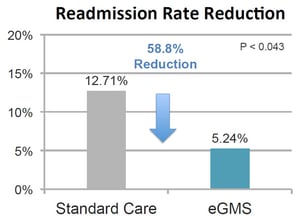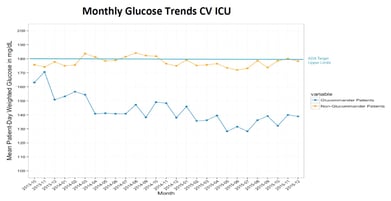Presentation
Annual Diabetes Technology Meeting
Date
November 2016
Authors
April Mumpower,1 Tamera Parsons1
OBJECTIVE
The CMS Hospital Readmission Reduction (HRR) program added Coronary Artery Bypass Grafting (CABG) to their list of diagnoses that will be measured beginning in October 2016. Hospitals will be penalized for readmission rates above CMS targets. Unrecognized and uncontrolled inpatient hyperglycemia in the CABG population has been shown to lead to increased readmission rates. Reducing hyperglycemia through intensive insulin therapy has shown trends toward reducing the rates of readmissions. This study evaluated the readmission outcomes of patients using an Electronic Glycemic Management System (eGMS) Glucommander (GM) for inpatient insulin management versus insulin managed by Standard Care (SC) in patients undergoing CABG procedures.
METHODS
This retrospective study evaluated 448 patients undergoing CABG procedures who were admitted to a 525-bed teaching hospital over a 32-month time frame from May 2013 through December 2015. Qualifying patients were on an insulin regimen with a prescribed glucose target of 100-140 and case-matched to either the eGMS IV and SubQ program GM or clinician lead SC. The primary outcome measure was Risk Adjusted Readmission Rates over the 3 years.
RESULTS
Patients (n=267) treated with eGMS had a Risk Adjusted Readmission rate of 0.53 (M=0.53, SD=2.560) and a readmission rate of 5.24% undergoing a CABG procedure. Patients (n=181) treated with SC had a Risk Adjusted Readmission rate of 1.11 (M=1.11, SD=3.237) and a readmission rate of 12.71% for CABG. eGMS had a significantly lower readmission rate compared to SC (t(376)=2.028, p <0.043).
| Patient Characteristics | eGMS | Standard Care | p Value |
|---|---|---|---|
| Average Admission Blood Glucose | 264.3 mg/dL (SD = 196.4) | 234.9 mg/dL (SD = 140.3) | <0.0001 |
| Average Final Blood Glucose | 127.9 mg/dL (SD = 62.84) | 185.68 mg/dL (SD = 69.6) | <0.0001 |
| % of Blood Glucose Events Hypoglycemia <40 mg/dL | 0.009% | 0.36% | <0.0001 |
| % of Blood Glucose Events Hyperlgycemia <70 mg/dL | 0.48% | 2.61% | <0.0001 |
| % of Blood Glucose Events Hyperglycemia 70-180 mg/dL | 87.7% | 58.5% | <0.0001 |
| % of Blood Glucose Events Hyperglycemia >180 mg/dL | 11.8% | 38.9% | <0.0001 |
| % of Patients Hypoglycemia <40 mg/dL | 0.38% | 7.26% | <0.0001 |
| % of Patients Hypoglycemia <70 mg/dL | 12.56% | 28.7% | <0.0001 |
| Risk-Adjusted Readmission Rate | eGMS | Standard Care |
|---|---|---|
| Number of Patients | 267 | 181 |
| RARR | 0.53 | 1.11 |
| SD | ±2.56 | ±3.237 |
CONCLUSION
There was a significant reduction in readmission rates, admission versus final blood glucose, overall and severe hypoglycemia with eGMS versus standard care. There were no other readmission initiatives occurring during this time period. These results suggest that intensive glycemic management by an eGMS can significantly reduce the rate of readmissions for patients who are in need of insulin management while hospitalized for a CABG procedure compared to patients managed with Standard Care.
Affiliations
- Mountain States Health Alliance, Johnson City, Tennessee.

